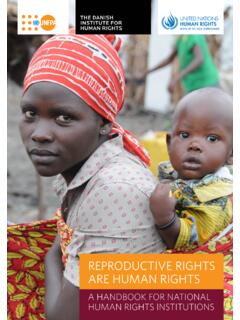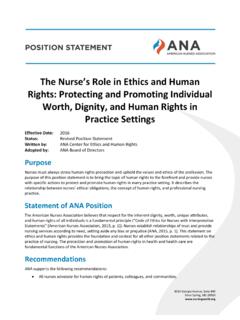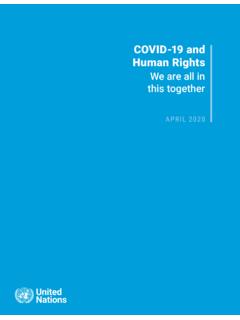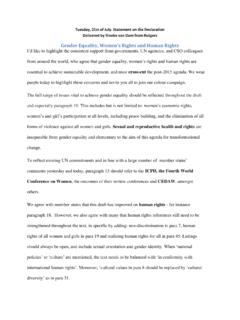Transcription of The Promotion of Human Rights - GOV.UK
1 The review of the register of charities The Promotion of Human Rights January 2005. The Charity Commission The Charity Commission is the independent regulator of charities in England and Wales. Its aim is to provide the best possible regulation of charities in England and Wales in order to increase charities' effectiveness and public confidence and trust. Most charities must register with the Commission, although some special types of charity do not have to register. There are some 180,000 registered charities in England and Wales. In Scotland the framework is different, and the Commission does not regulate Scottish charities. The Commission provides a wide range of advice and guidance to charities and their trustees, and can often help with problems. Registered charities with an annual income over 10,000 must provide annual information to the Commission. The Commission has wide powers to intervene in the affairs of a charity where things have gone wrong. Published by the Charity Commission Contents Summary 2.
2 The Promotion of Human Rights as a charitable purpose 3. Analogy with an existing charitable purpose 3. Benefit to the community 3. Clarity of purpose 3. Ways of promoting Human Rights 4. promoting Human Rights at home and abroad 4. Monitoring abuses of Human Rights 4. Obtaining redress for victims of Human Rights abuse 4. Relieving need among the victims of Human Rights abuse 4. Research into Human Rights issues 4. Educating the public about Human Rights 5. Technical advice to governments and others on Human Rights matters 5. Contributing to the sound administration of Human Rights law 5. Commenting on proposed Human Rights legislation 5. Raising awareness of Human Rights issues 5. promoting popular support for Human Rights 5. International advocacy of Human Rights 6. Eliminating infringements of Human Rights 6. Political activities 6. Example: object for a Human Rights charity 7. 1. One of the recommendations of the Strategy Unit's report Private Action, Public Benefit' was that the Commission's guidelines on campaigning should be revised to adopt a less cautionary, more positive approach.
3 The Commission accepted that recommendation and has published a revised version of the leaflet CC9. At the same time, following public consultation, we have revised and clarified our guidance on the Promotion of Human Rights as a charitable purpose. (It should be noted that the revised guidance explains that the Promotion of Human Rights is charitable as the law stands by analogy with other charitable purposes. However, once it is enacted, the Charities Bill will provide a statutory basis for treating the Promotion of Human Rights as charitable). Summary 1. This guidance explains why the Promotion of Human Rights is recognised as a charitable purpose. It also considers the various ways (including political campaigning) in which a charity may promote Human Rights . 2. The Promotion of Human Rights is charitable by analogy principally with charitable purposes concerned with moral or spiritual welfare and improvement. 3. There are many ways in which a charity might seek to promote Human Rights , including: monitoring abuses of Human Rights .
4 Obtaining redress for the victims of Human Rights abuse;. relieving need among the victims of Human Rights abuse;. research into Human Rights issues;. educating the public about Human Rights ;. providing technical advice to government and others on Human Rights matters;. contributing to the sound administration of Human Rights law;. commenting on proposed Human Rights legislation;. raising awareness of Human Rights issues;. promoting public support for Human Rights ;. promoting respect for Human Rights by individuals and corporations;. international advocacy of Human Rights ;. eliminating infringements of Human Rights . The purposes of a charity must be clear, unambiguous and exclusively charitable. An organisation 4. seeking to establish itself as a charity to promote Human Rights must therefore identify the code or codes of Human Rights which it is seeking to promote. If it will operate only in one country or region, it must identify that country or region. We recommend that it should also specify in its stated purposes the ways in which it will promote Human Rights .
5 At the end of this publication we give an example of how a Human Rights charity with very wide purposes might draw up its object. The Promotion of Human Rights will often involve engagement with the political process and a Human 5. Rights charity is able to engage in a very wide range of political activity within the parameters which are described in this guidance. Organisations set up for political purposes (or partly for political purposes) cannot be charities and we examine the extent to which this legal principle affects the scope for promoting Human Rights as a charitable purpose. 2. The Promotion of Human Rights as a charitable purpose 6. For a purpose to be recognised as charitable, it must be shown that the purpose is (1) analogous to a purpose which has already been accepted as charitable and (2) beneficial to the community. The purpose must also be sufficiently clear for the Court (and the Commission) to be able to control and give effect to it. Analogy with an existing charitable purpose 7.
6 The Commissioners have decided that, when asked to draw an analogy with existing charitable purposes, they should take a constructive and imaginative approach, adapting the concept of charity to meet constantly evolving social needs. 8. Depending upon the means by which Human Rights are promoted, there are many existing charitable purposes which might be regarded as appropriate analogies. Given that respect for Human Rights is widely regarded as a moral imperative, the well-established charitable purpose of promoting the moral or spiritual welfare and improvement of the community provides a sufficient (but not the only). analogy for treating the Promotion of Human Rights generally as charitable. 9. It is by analogy with moral improvement that we have registered as charities bodies which are concerned to promote good race relations, to eliminate discrimination on grounds of race and to encourage equality of opportunity between persons of different racial groups;. to promote equal Rights for women and for homosexuals.
7 To promote ethical standards of conduct and compliance with the law in the workplace;. to promote religious harmony; and to promote equality and diversity. Benefit to the community 10. Human Rights are Rights which: are fundamental in the sense of being essential to our humanity or to our functioning as Human beings;. accordingly have a moral dimension;. extend to everyone; and prescribe what the State must do for us, and what it must not do (or allow others to do) to us. 11. The concept of Human Rights is virtually unanimously endorsed by the countries of the world (even if strict observance of these Rights is intermittent). The United Nations Convention on the Rights of the Child, for example, has been ratified by 191 countries (only two countries have failed to do so). The United Kingdom government has incorporated the European Convention for the Protection of Human Rights and Fundamental Freedoms into domestic law. 12. There is an obvious public benefit in promoting Human Rights .
8 For individuals whose Human Rights are thereby secured, the benefit is immediate and tangible. There is also a less tangible, but nonetheless significant, benefit to the whole community that arises from our perception that the fundamental Rights of all members of the community are being protected. That provides sufficient benefit to the community to justify treating the Promotion of Human Rights as a charitable purpose in its own right. 3. Clarity of purpose 13. There are several different codes of Human Rights . The most widely accepted are the Universal Declaration of Human Rights and subsequent United Nations Human Rights conventions and declarations. Outside the auspices of the UN, there are other international and regional codes, as well as codes which have been established by individuals and NGOs. In order to achieve the degree of certainty in the expression of its objects that is necessary for charitable status, individuals creating charities for the Promotion of Human Rights need to specify the body of Rights that they seek to promote.
9 In practice, given the primacy of the Universal Declaration, that is likely to involve reference to the Declaration and subsequent UN-sponsored standards. 14. The purposes of a charity must be exclusively charitable. Hence an organisation established for purposes some of which are charitable and some of which are non-charitable cannot be a charity. The Promotion of Human Rights is a broad concept which can include non-charitable purposes (especially, of course, political purposes). We therefore recommend that a Human Rights organisation seeking to establish itself as a charity should set out its purpose in its governing document as precisely as possible. If the organisation's purpose is very wide, we recommend that it should set out the ways in which it will promote Human Rights . The following paragraphs describe some of the ways (there may well be others) in which a charity might promote Human Rights . Each of these ways of promoting Human Rights is, of course, also capable of being a charitable purpose in its own right.
10 At the end of this guidance we provide an example of a very widely-drawn object for a Human Rights charity. Ways of promoting Human Rights promoting Human Rights at home and abroad 15. Generally, for an organisation set up to operate abroad to be a charity under the law of England and Wales, it must be the case that the objects of the organisation would be charitable according to English law if its purposes were to be carried out in England and Wales. 16. The following list of various ways in which a charity might promote Human Rights is not exhaustive. Monitoring abuses of Human Rights 17. A charity concerned with promoting Human Rights may engage in monitoring and reporting breaches of a country's Human Rights obligations, whether those obligations arise under domestic legislation or international standards. Obtaining redress for victims of Human Rights abuse 18. A Human Rights charity may bring pressure to bear in individual cases (including through the mobilisation of public opinion) to encourage a government to respect its own Human Rights legislation.

















